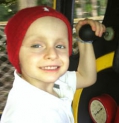Targeting splicing in chemoresistant ewing sarcoma

Mentor Name: Seth Corey
Ewing sarcoma (ES) is a rare, aggressive cancer primarily affecting children, adolescents, and young adults, with peak incidence between ages 10 and 20. Resulting from chromosomal translocations involving EWSR1 and FLI1 genes, the EWSR1::FLI1 fusion protein drive the cancer formation in ~85% of the cases. Current treatments, including surgery, radiation, and chemotherapy (vincristine, doxorubicin, cyclophosphamide, ifosfamide), yield a five-year survival rate of ~70% for localized disease but only 20-30% for metastatic or recurrent cases. There is a great need for new agents. We have developed a doxorubicin-resistant A673 ES cell line. A673 ES cells also harbor a mutation in TP53. We have conducted a small molecule screen in A673 cell and have identified two dozen hits. Several of these target splicing. Cirtuvivint (SM08502), a spliceosome modulator (developed by Biosplice Therapeutics Inc.) inhibits Cdc2-like (CLK) and dual-specificity tyrosine phosphorylation-regulated (DYRK) kinases. It has shown promise in preclinical studies, with EC50 in low nanomolar concentrations. A phase I trial demonstrated its tolerability and therapeutic benefit in solid tumors. We will grow A673 parental and A673 doxorubicin resistant cells and perform a dose-growth inhibition Alamar Blue for cirtuvivint and several other hits. The most promising hits will then be assayed for tumor inhibition in our transgenic EWSR1::FLI1 zebrafish model for ES. Standard Chi-square testing will be done to determine statistical significance.

